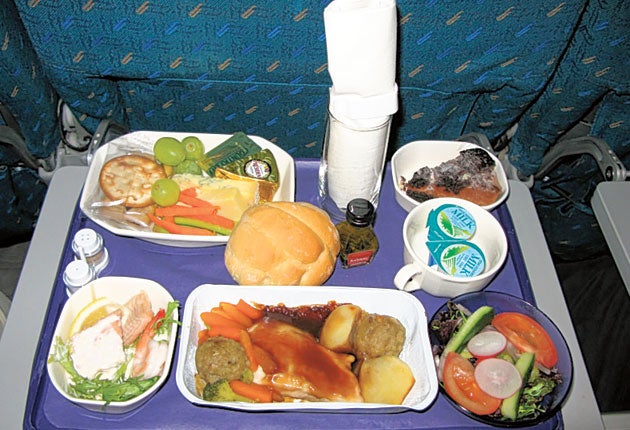Science finds the plane truth about in-flight meals

Your support helps us to tell the story
From reproductive rights to climate change to Big Tech, The Independent is on the ground when the story is developing. Whether it's investigating the financials of Elon Musk's pro-Trump PAC or producing our latest documentary, 'The A Word', which shines a light on the American women fighting for reproductive rights, we know how important it is to parse out the facts from the messaging.
At such a critical moment in US history, we need reporters on the ground. Your donation allows us to keep sending journalists to speak to both sides of the story.
The Independent is trusted by Americans across the entire political spectrum. And unlike many other quality news outlets, we choose not to lock Americans out of our reporting and analysis with paywalls. We believe quality journalism should be available to everyone, paid for by those who can afford it.
Your support makes all the difference.The inexplicable blandness of airline food has been pondered at 30,000 feet by generations of travellers. Now an explanation has been offered in the form of research showing that people lose their sense of taste when listening to the sort of "white noise" heard inside an aircraft's cabin.
White noise consists of random collections of sounds at different frequencies – such as the muffled noise of aircraft engines – and scientists have demonstrated that it is capable of diminishing the taste of salt and sugar.
The findings could explain a phenomenon well known to airline companies: passengers tend to lose their sense of taste when they are in the air. For this reason, airline meals are often "improved" with extra salt, sugar and other flavourings.
The study also lends further support to the idea that sound plays an important role in the perception of taste. Heston Blumenthal, the celebrity chef, has exploited the trait in a specially designed seafood dish which is served while diners hooked up to iPods listen to the sound of surf crashing on a beach.
Ellen Poliakoff of Manchester University said the study investigated how background noise influenced a person's perception of food.
The scientists found that certain sounds not only affected people's sense of saltiness or sweetness, they also influenced how crunchy some types of food sounded to the diners – which in turn affected their perceptions of freshness and palatability.
"We've compared how people rated food that they ate while they sat in headphones listening to various kinds of sounds and we've speculated as to why this might explain why airline food has a reputation for not being very tasty," Dr Poliakoff said.
The white noise of an aircraft cabin could act as a distraction to a person's sense of taste, which would account for why airline food needs to compensate by being saltier or sweeter than usual. Alternatively, the effect could be due to the contrast between the pleasure of eating and the stress of listening to white noise, Dr Poliakoff said
The study involved asking a panel of volunteers to rate the taste of different kinds of food while listening to quiet or loud background noise, or no noise at all. Sweetness and saltiness were rated significantly lower in the presence of the louder background music, while crunchiness was reported to be higher when listening to loud sounds.
A further part of the study showed that people listening to sounds they deemed to be pleasant were also more likely to say that their food was tastier, which may explain why many restaurants play ambient background music.
"If you are enjoying the music you are listening to, it may affect the enjoyment of the food you are eating," Dr Poliakoff said.
Join our commenting forum
Join thought-provoking conversations, follow other Independent readers and see their replies
Comments